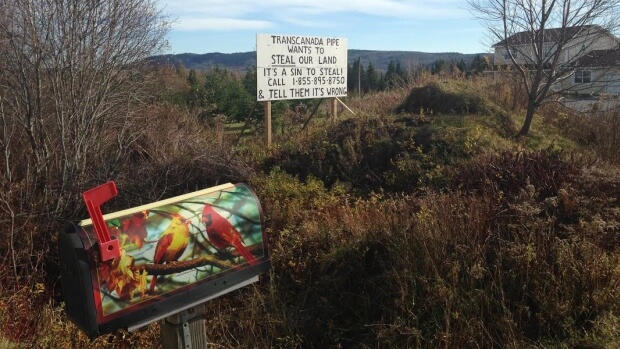
Hampton-area man may win Energy East route fight, group says
The following is an article published on cbc.ca on Monday, Nov. 17. Read the original post here.
The head of a national landowners’ lobby group says a Hampton-area man may succeed in diverting TransCanada Corp.’s proposed Energy East pipeline away from his property.
Dave Core, the chief executive officer of the Canadian Association of Energy and Pipeline Landowner Associations, said he has been following the case of Richard Verge of Titusville.
Verge’s home sits on the proposed route of the Energy East pipeline through New Brunswick.
Maps show the pipeline running through an unspoiled forest on the Verge property. It’s a property the family uses for outdoor recreation as well as nature hikes by area scout troops.
Verge is opposed to the proposed pipeline route and has promised to take his opposition to the National Energy Board.
Core said he’s impressed by the resistance Verge is showing and thinks he might succeed in forcing a route change despite the odds against him.
“Landowners have very few rights and I have to say I agree with Rick Verge’s stand on this, that he should have the right to say no. But under the National Energy Board Act and the legislation that supports that act, it’s very seldom that a landowner can say no, if ever,” Core said.
“I would say that Mr. Verge has a good chance of it because he’s articulate and he’s not scared to speak with the media and he’s done some things that most landowners wouldn’t think of doing. Most landowners are intimidated by the press and the activities of the land agents in convincing them to sign.”

Verge said his opposition began more than a year ago.
“It started with a land agent coming to visit my home in August of 2013 and at that time she just wanted us to take a thousand dollars and sign a piece of paper, saying in her words, ‘Just to allow somebody to walk on the property quickly and take a few soil and earth samples and look for endangered animals,’” he said.
He turned the offer down.
“You’re signing a lot more than for just a quick glimpse of your land,” he said.
Nine months later another land agent came calling.
“This gentleman came in and said, ‘It looks like the pipeline might be coming through your property,'” he said.
Pipeline could use Crown land instead: Verge
Since the visit Verge says he continues to see his property included on maps at public meetings showing the proposed route for the Energy East pipeline.
He says there is plenty of Crown land around his property that TransCanada could use instead for the pipeline without disrupting anything.
He’s now vowing to take his story to the meeting rooms of the National Energy Board when it begins hearings on the Energy East project.
“The reason I bought the property was for forest, for trails that I’ve made thought there for myself and my family to enjoy,” Verge said.
“A pipeline puts a 300-foot-wide clear cut swath through the forest and that’s not just a one-time thing, that’s a forever thing.”
TransCanada has submitted a formal application to the National Energy Board for the Energy East pipeline project, which would carry 1.1 million barrels per day of crude oil from Alberta eastward to refineries on Canada’s East Coast.
The idea for Energy East is to take Alberta oil to terminals planned for Quebec and New Brunswick, enabling shipments to Europe, India and other destinations while not relying on American infrastructure.
Energy East proponents say the pipeline project will create jobs and economic growth while cementing Canada’s status as an energy independent oil superpower.
TransCanada claims the project will directly or indirectly create 14,000 jobs, and help create $36 billion worth of economic activity.
New Brunswick Premier Brian Gallant has been a vocal supporter of the project.

